Sunday Longread: Your Worst Self Makes Them Rich. Your Better Self Makes You Free.
A case of conscious self-regulation.
Every platform you touch today makes money by making you forget yourself. Not entirely, of course. Just enough to confuse immediate for authentic, impulsive for honest, reactive for real.
This was not always the case. Historically, civilization was a project of slowness. Of restraint, of teaching the animal within to wait its turn. To become human was to learn to pause.
But the modern interwebs don’t want you human. They want you clickable.
And your first reaction, limbic, loud, limb-flailing, is the most clickable thing you have.
Scroll long enough and you’ll see it: platforms that call for “authenticity” are not interested in your wholeness. They are interested in your accessibility. Your most reactive self is the most accessible: no editorial delay, no friction, no shame.
This is not just a personal problem. It is civilizational.
The architecture of the internet has been built not to elevate the considered self, but to provoke the immediate one. Not to reward your second thoughts, but to monetize your first.
And your first thought is almost always your worst.
The philosopher Byung-Chul Han writes that “the violence of positivity” defines our era. Not the violence of suppression, but of forced exposure, emotional nudity, and performative presence. We are told to always be real, visible, raw. To speak before we think.
In this world, to regulate is to repress. And repression is heresy in the church of algorithmic transparency.
But what if regulation isn’t repression? What if it is power? What if it is the only freedom left?
This essay is about that question.
It is about what we lost when we decided that the unfiltered self was the truest one. It is about how virality thrives on your disintegration. It is about why the self that pauses is not cowardly, but sovereign.
And it is about how, in a world that rewards dysregulation, self-governance might be the last meaningful act of rebellion.
The Myth of the Real You
The idea that your first reaction is somehow more “real” than your second is one of the most successful lies of the modern era. It is a lie so natural, so flattering to our instincts, that it rarely even feels like a lie.
It goes like this: the first thing you feel, the anger, the joy, the jealousy, the sting, is pure. Untainted. Authentic. The second thing you feel, the measured thought, the filtered judgment, the pause, is false. A mask. A concession to others.
We have been taught that our truest self is our most impulsive self.
This has always been convenient for power.
You can see its fingerprints all over the architecture of social media. Platforms reward the raw, the immediate, the unfiltered, not because these reactions are more meaningful, but because they are easier to provoke, cheaper to extract, and more contagious to monetize.
René Girard’s work on mimetic desire explains why this is so effective. In Violence and the Sacred, Girard argued that much of what we think of as authentic desire is, in fact, a copy, a reaction to what others desire, what others signal. We do not want in isolation. We want what we see others wanting.
In this light, the internet is not a place where you discover your authentic self. It is a place where you learn, in real time, which feelings are trending, and then adopt them as your own. You believe the outrage is yours. You believe the envy is yours. You believe the craving is yours.
It feels authentic. It is not.
This dynamic is not new. Ancient moralists understood that the self is a layered thing. Stoic philosophers in Rome described the animal soul, quick and grasping, and the rational soul, slower and deliberative. Confucius wrote that learning to act with li, or ritual propriety, required resisting immediate desire in favor of cultivated conduct. To be civilized was to train the animal within, not to worship it.
But today we have inverted the hierarchy. We have made a god of the untrained animal.
Han describes this as the “tyranny of transparency.” In his Psychopolitics, he writes that the demand to always be open, to always be visible and unfiltered, is not liberation but control. When you are compelled to be naked, you have no room to hide, and therefore no sovereignty.
That is what platforms sell you when they sell you authenticity. Not freedom. Not truth. Just visibility. And visibility is not the same as agency.
Your first reaction is not more real because it is fast. It is just closer to instinct, to limbic residue, to the most easily exploitable parts of yourself.
Your second reaction is not less real because it is slow. It is just closer to reason, to choice, to the parts of yourself that belong to you alone.
So much of modern life is an elaborate effort to keep you from discovering your second self. Because if you did, you would not be so easy to provoke. Or to predict. Or to sell to.
And that, to the system, is a problem.
A Civilization In Reverse
Civilization, properly understood, was never about suppressing feeling altogether. It was about learning to feel later.
For most of human history, the ability to defer one’s reaction: to endure insult without collapse, to plan revenge rather than scream it, to hold composure through humiliation, was seen as strength. We invented whole codes of conduct to ritualize this strength. Samurai studied seishin, the quiet mind. European courts elevated sprezzatura, the art of appearing unruffled. Even the Victorian obsession with tact, with its stiffness and hypocrisy, was at least an acknowledgment that first feelings are dangerous things to act on.
To regulate yourself was to prove you were fit to join the public square. The animal was private. The human was public.
But somewhere in the last half-century, we reversed this.
We began to treat self-restraint not as a virtue but as a defect. We decided it was dishonest. That a pause was repression. That anything unspoken was hypocrisy.
We called it “authenticity.” And we forgot why civilization needed masks in the first place.
The historian Christopher Lasch wrote about this reversal in The Culture of Narcissism. When society lost confidence in the future, when religion, patriotism, and even economic progress stopped offering people meaning, individuals stopped being stewards of something larger. They became curators of themselves. The self became the project. The self became the brand.
And in a world where the self is the brand, nothing is more dangerous than being seen as inauthentic.
It is worth asking who benefits from this reversal.
If you are a platform whose profit depends on users producing more content at higher emotional temperatures, you benefit enormously when people lose their internal brakes. If you are a media ecosystem addicted to outrage clicks, you benefit when people confuse performative fury with moral courage.
But the individual: does she benefit?
We are told this reversal is progress. That the unfiltered self is the liberated self.
But look around: people are more anxious, not less. More brittle, not stronger. More visible, but less seen.
What we call progress is simply speed: the faster we speak, the faster we react, the more the machine eats. And the faster we lose our ability to tell ourselves apart from our instincts.
Byung-Chul Han calls this “the hell of the same.” When everything is immediate, everyone is predictable, and nothing surprises anymore. When every conflict follows the same template, every reaction follows the same script.
We have mistaken speed for freedom. In doing so, we have undone what civilization once achieved: a measure of control over our own temperature.
What was once called restraint is now called repression. What was once called deliberation is now called cowardice. What was once called dignity is now called dishonesty.
And so we have become a civilization in reverse. Moving faster, feeling louder, becoming easier to herd.
The machine prefers us this way.
It prefers us hot, predictable, and fast.
But human beings, at our best, are none of those things.
How They Profit
It is a curious thing to live in a time when the most profitable thing about you is also the least admirable thing about you.
Your reactive, emotionally incontinent self is simply more valuable than your sovereign one.
Why? Because it is easier to provoke. Easier to predict. Easier to monetize.
Shoshana Zuboff, in The Age of Surveillance Capitalism, calls this the extraction of “behavioral surplus.” Every provoked reaction you offer, every hasty comment, every angry share, every thirst-post, every defensive quote-tweet, creates data. That data feeds prediction models. Those models feed advertisers. And the advertisers pay.
If you were a little more regulated, there would simply be less to extract.
If you waited to feel your second self before you spoke, you might write one thoughtful post instead of fifty angry replies. If you doubted the headline before retweeting it, you might break the chain of contagion before it could spread. If you stepped away before you reacted, you might find you had nothing left to say at all.
And that would make you less valuable.
Because platforms are not built to make you better. They are built to make you engaged.
And what keeps you engaged is whatever keeps you dysregulated.
That is why the platforms amplify moral outrage. Yale researchers analyzing millions of tweets found that outrage spreads faster, farther, and more predictably than calm. Worse, they found that users whose outrage was rewarded learned to be more outraged in the future. Outrage literally trains itself.
That is why the platforms amplify anxiety. Negativity bias, the human tendency to pay more attention to threat than to comfort, is a bug in our evolution, but a feature of their business model. Fear keeps you scrolling.
That is why the platforms amplify identity conflict. We are tribal creatures. Girard’s work on mimetic rivalry shows how fragile our sense of self becomes when we see others rewarded for what we lack. Nothing provokes faster than seeing someone we think is our equal getting more attention, more likes, more belonging.
And all of this is measurable. The more provoked you are, the longer you stay. The longer you stay, the more ads they serve you. The more ads they serve you, the more quarterly targets they hit.
Your untrained self is someone else’s revenue stream.
They will never tell you this directly. They don’t have to. The entire system is designed to pull you toward what Han calls the “pornography of immediacy”, where your most impulsive reaction becomes your default self, and your better self is left to atrophy.
You do not have to consent explicitly. You only have to stop noticing.
That is what surveillance capitalism demands of you: your unthinking cooperation in the erosion of your own sovereignty.
And it works.
Because your worst self is easier. And cheaper. And faster.
And very, very good for business.
Why Regulate At All?
Why bother regulating yourself in a world that punishes restraint and rewards the loudest person in the room?
Because to regulate is not to be polite. It is to be free.
It is easy to forget this because the language of regulation has been debased. Self-regulation is sold to us now as a kind of productivity hack. Stay calm so you can meet deadlines. Control your temper so you can keep your job. Meditate so you can fall asleep faster.
But the real reason to regulate yourself has nothing to do with being more employable, or more likeable, or more zen.
It has to do with refusing to let the system finish the project of your dehumanization.
When you regulate yourself, when you pause before reacting, when you choose your second self over your first, you are asserting authorship over your own life. You are saying: I will not be farmed. I will not be predictable. I will not let my worst self write the story.
This is not repression. This is sovereignty.
Repression fears feeling. Regulation feels everything, but chooses which deserve a voice.
It is not about being agreeable. It is about being deliberate.
You can be angry (sometimes you should be angry) but you should be angry in a way that does not make you a marionette for someone else’s algorithm.
You can be sad (sometimes you should be sad—) but you should grieve on your own terms, not on a schedule dictated by the feed.
You can be joyful, but your joy should not be a commodity, endlessly packaged and sold back to you.
Transparency culture confuses nakedness with authenticity. The authentic self is actually hidden. It has depth, opacity, reserves of mystery that resist full exposure. This is what makes it human.
To regulate yourself is to defend that hiddenness. To say: not every thought I have is for you. Not every wound is performative. Not every anger is a spectacle.
To regulate yourself is to leave something untouched for yourself alone.
And in a civilization that has confused visibility with value, that is the most radical act you can commit.
Because your better self, the one that waits, considers, and decides, is not profitable to anyone but you.
And maybe that is reason enough.
Seven Rules For Sovereign Sabotage
Exploit your unpredictability: Algorithms thrive on patterns. The more predictable your outrage cycles, the easier you are to model, to serve, to sell. Break your own patterns. React late. React differently. React not at all. Make yourself impossible to forecast. Uncertainty is leverage.
Convert provocation into reconnaissance: Every insult, every headline, every baited hook is free intelligence about what the system thinks will move you. Study what provokes you as data, not command. Learn the triggers they’ve built for you, then disarm them.
Engineer friction: Efficiency is their weapon, not yours. They want your anger delivered frictionless, your envy frictionless, your shame frictionless. You regain power by making things cost more effort, on purpose. Draft in longhand. Log out between posts. Turn delays into fortifications.
Hoard optionality: Never act as if this moment is the only chance to speak, the only chance to strike. Platforms feed you urgency to strip you of optionality. Learn to sit on decisions longer than feels comfortable. Time multiplies your choices. Impulse eliminates them.
Obscure your interiority: What they can see, they can manipulate. Do not volunteer your full interior state to people who profit from it. Cultivate opacity, not as cowardice, but as strategy. Be clear where you must, and unreadable where you can afford.
Reframe rage as capital: Outrage, properly stored, compounds. Reacting immediately is like spending principal. Wait, and you can deploy your anger tactically, when it has maximum impact and minimum cost. A cold-blooded strike is worth a thousand hot flails.
Stay asymmetrically calm: In a room full of provoked people, the calmest one sets the frame. That is power. The person who does not escalate cannot be cornered, cannot be gamed. Don’t confuse serenity with surrender. Stillness is often the most violent move available.
And if you’re sitting there thinking: “All right, fine, but what the hell does 'sovereign sabotage' look like on a Tuesday afternoon when Slack is blowing up and the feed is screaming at me?”, Here’s your to-do list for the day:
Audit your triggers. Make a short list of topics, situations, or people who consistently provoke you into instant reaction. If you can name them, you can start designing guardrails around them instead of walking into the same trap every time.
Review your last 10 posts or comments. Ask yourself: Who benefited from each? If the answer is “the platform” or “my ego,” consider what a more deliberate version would have looked like.
Design a delay mechanism. Decide, right now, what your friction looks like. A draft folder, a 24-hour rule, a second pair of eyes. Slowing yourself down doesn’t happen automatically; you need to build the system before you need it.
Track your visibility debt. Every time you overshare or react publicly, you incur a little liability. You’ve given away part of your interiority. Take stock of how much of yourself you’ve already spent, and decide what to claw back.
Define your second self. Write down the traits of the person you want to be seen as, not just the first reaction that flares up. Keep it somewhere visible. When you’re tempted to react, ask: Would that version of me answer this way?
Mute one thing today. An account, a keyword, a chat group. You don’t have to amputate everything at once. Just pick one and notice how much mental quiet it buys you.
Draft instead of post. Next time you feel compelled to react, open a doc, draft it privately, and close it. Leave it overnight. Half of what you thought was urgent will die of natural causes by morning.
Practice asymmetric calm. In your next tense meeting, debate, or comment section, do nothing for 30 seconds longer than everyone else. Watch how the room (or thread) changes just because you didn’t flinch.
Decide your opacity zones. Pick one part of your life you’ll no longer discuss or disclose publicly. Treat it as a small act of sovereignty, and guard it like an unlisted asset.
Set your horizon. Identify one goal or principle that is yours alone, independent of mimetic desires. Write it down and return to it when everyone else is yelling about what matters this week.
Call these rules. Call them tactics. Or call them, as Han might say, “aesthetic self-defense.”
But practice them anyway. Every time you do, the machine earns less off your life.
What Self-Regulation Builds In You
It is easy to frame self-regulation as purely defensive: as a way to deny others the right to profit off your reactive self. That’s already a noble goal.
But the deeper reason to practice it is this: your better self is not just more sovereign. It is more useful.
Every moment you resist the bait, you recover a little more presence. Every time you let the initial heat dissipate, you discover sharper questions hiding beneath your anger. Every time you choose your second self over your first, you move closer to the kind of person who builds things, instead of just reacting to things.
Self-regulation gives you back the most precious mental assets in the modern world: focus, discernment, judgment.
It sharpens your thinking because it forces you to distinguish signal from noise. It sharpens your work because it gives you the patience to iterate, not just ship. It sharpens your relationships, because it lets you listen without projecting, and speak without wounding needlessly.
More than anything, it sharpens your presence.
We think of presence as some mystical trait. It isn’t. Presence is simply the discipline of not letting your mind get hijacked by every passing provocation. Presence is what remains when you stop performing and start paying attention.
If you’ve ever watched someone walk into a room who seems unflappable, not cold, not detached, just…composed, you’ve felt its power. That is not natural talent. That is cultivated restraint.
And the world is starving for people like that.
People who can see past the bait, who can hold their tongue when others are shouting, who can walk into chaos and slow it down just by standing still.
People who can think.
In business, this discipline compounds. You stop chasing every competitor’s move and start building toward your horizon. You stop making decisions from fear or envy and start making them from clarity.
In love and friendship, it deepens trust. People feel safer around someone who does not erupt at every slight, who does not broadcast every private thought.
Even in private, it creates dignity. You no longer have to feel ashamed of what your limbic self did at 2 a.m., because you chose to wait.
Self-regulation is a craft.
A craft that builds a stronger you, one whose sovereignty is not just aesthetic, but functional.
And in the long run, it does more than just starve the machine.
It feeds you.
The Unprofitable Self
The world has become astonishingly efficient at making your worst self lucrative.
It has optimized every mechanism, economic, algorithmic, and mimetic to reward immediacy, punish pause, and convert volatility into revenue. Your dysregulation is someone else’s business model.
So you regulate, not to appear virtuous, but to remain sovereign.
You regulate because the moment you hand over your interiority to their provocations, you cease to own it.
You regulate because the individual who cannot regulate himself becomes a node in someone else’s system, predictable and extractable.
You regulate because self-possession is not a moral luxury. It is the precondition for judgment, for power, for dignity.
You regulate because, in an era that trades on transparency and impulse, opacity and deliberation are forms of quiet violence.
You regulate because nothing frightens a machine more than a human being who refuses to behave as expected.
And because nothing builds you faster than the discipline of holding something back, long enough to know whether it was ever worth giving.
That is the truth no one tells you about emotional sovereignty: it is not gentle. It is not neutral. It is not even fair.
It is the decision to deny your volatility to others and reserve your sovereignty for yourself.
And in a time when everything around you is designed to extract, perform, and display, this is not just resistance.
It is how the future remains yours.



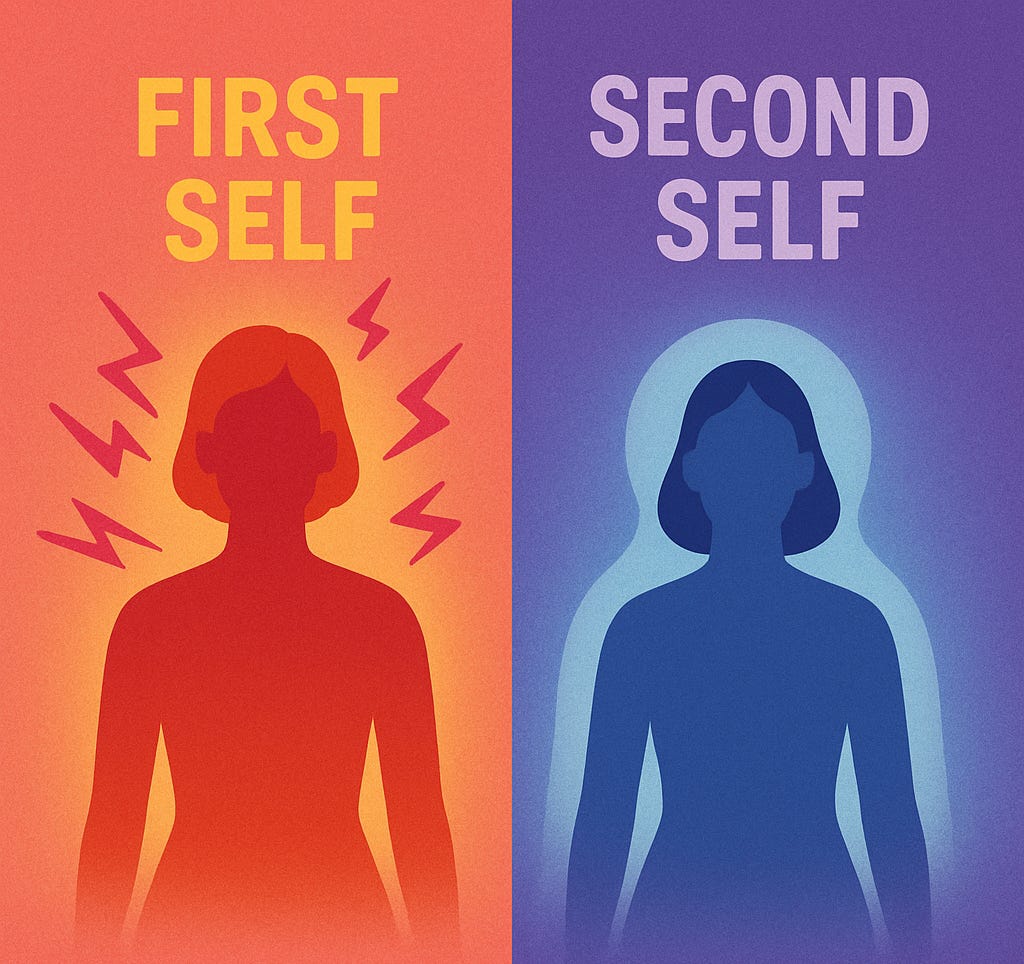
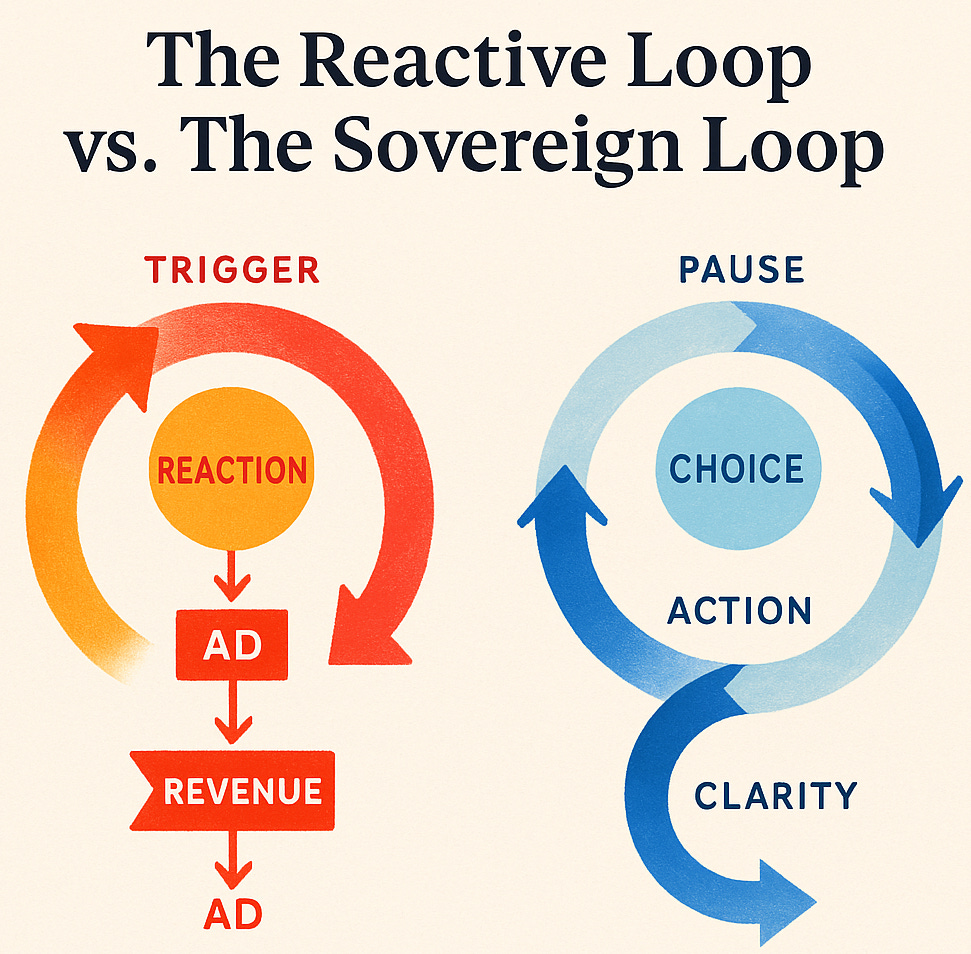
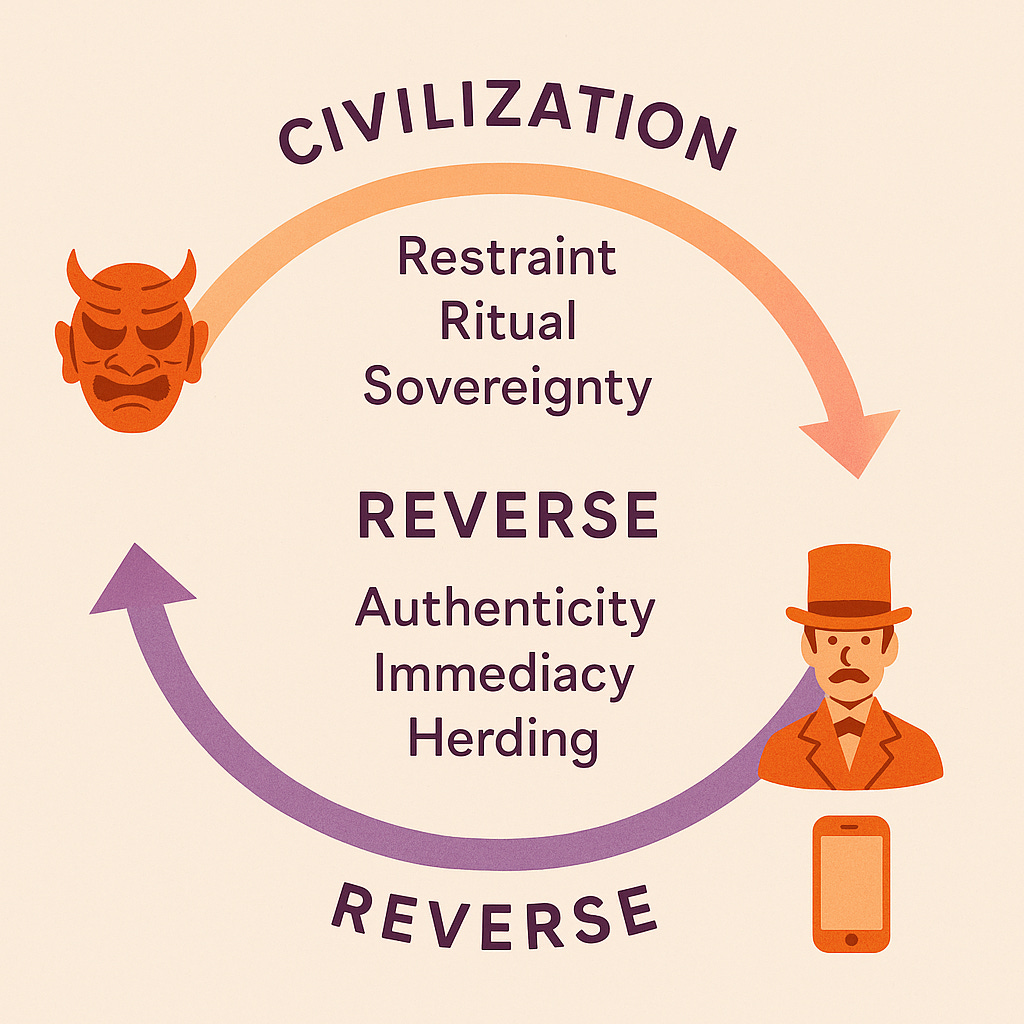
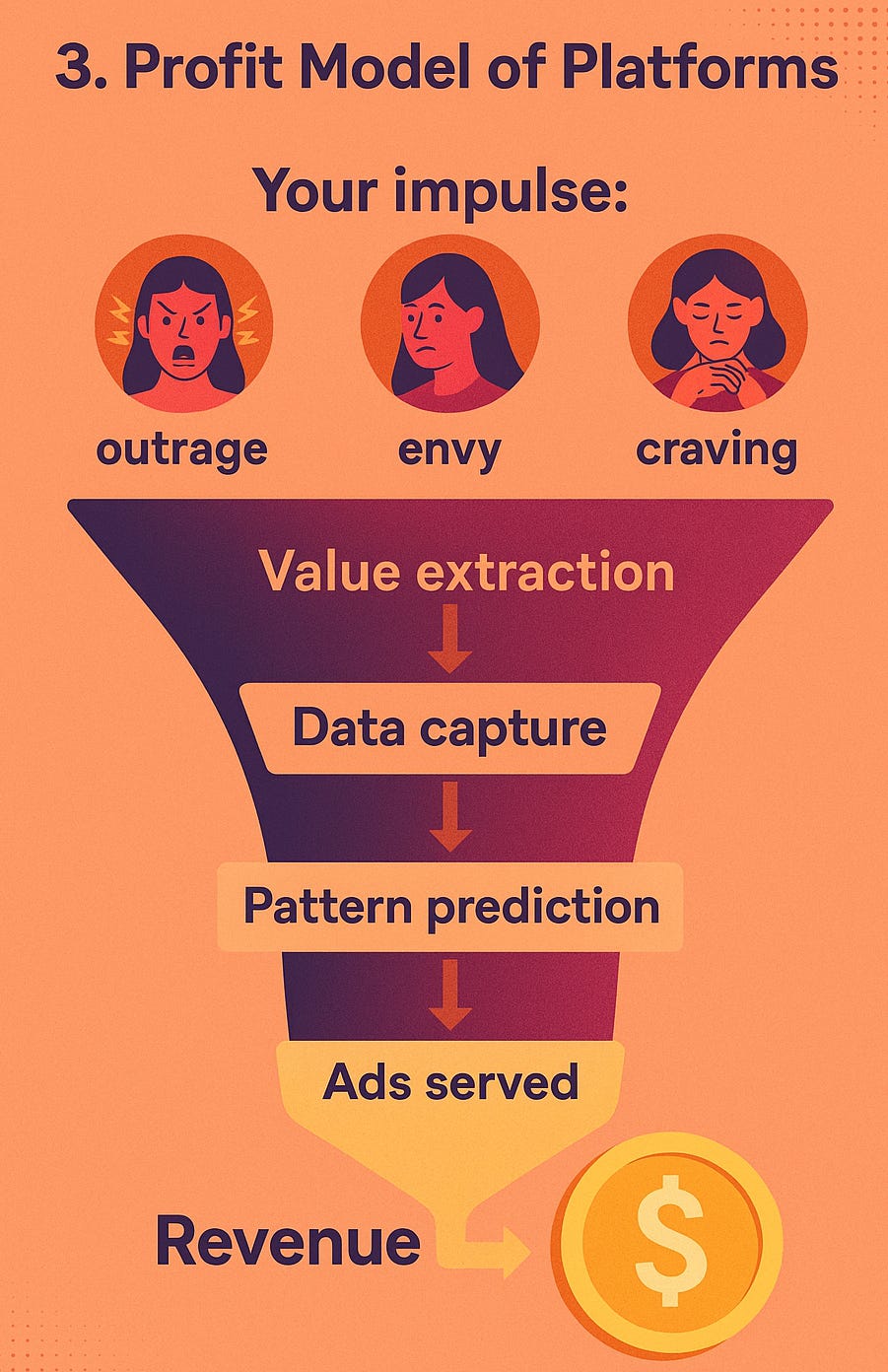
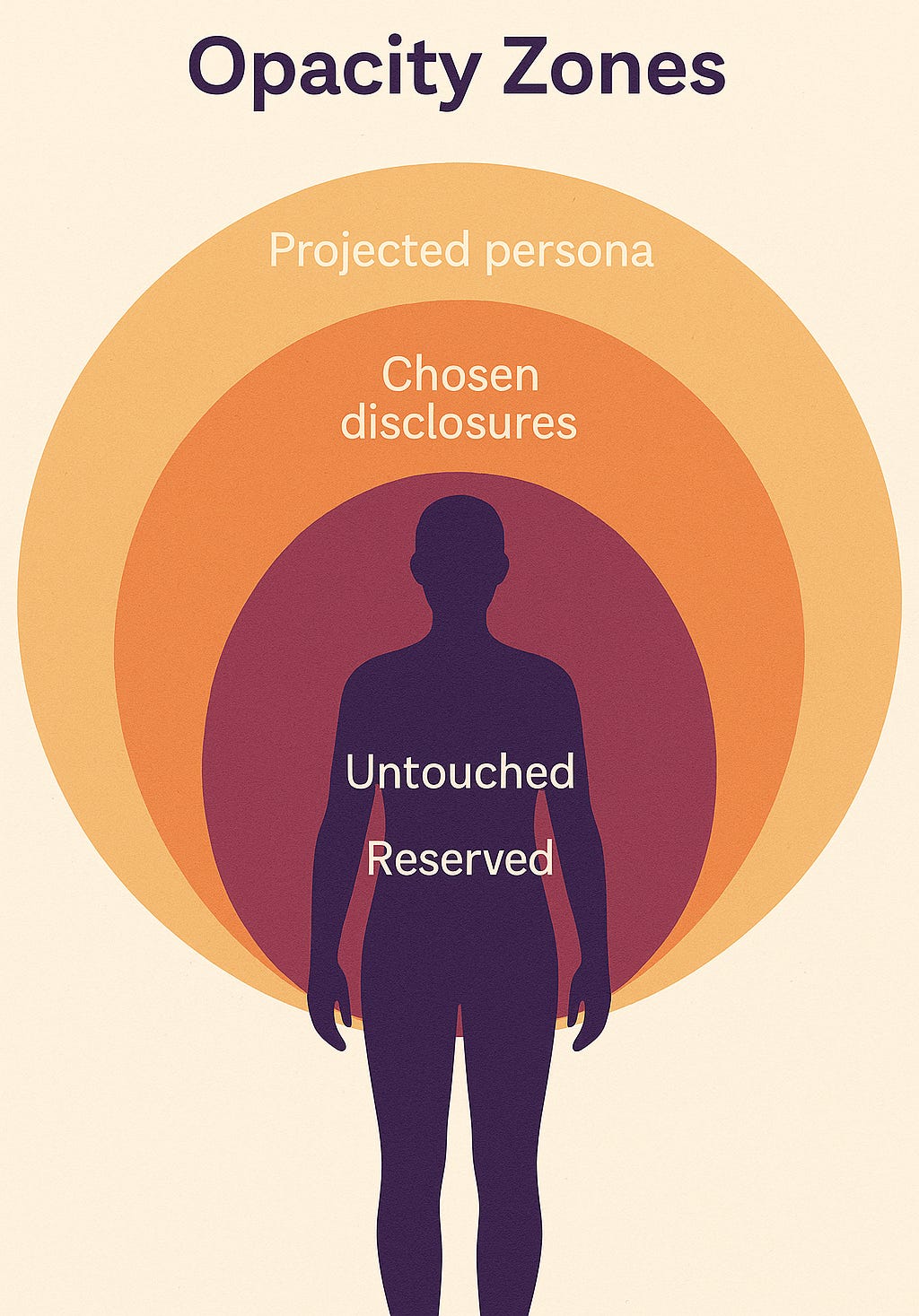
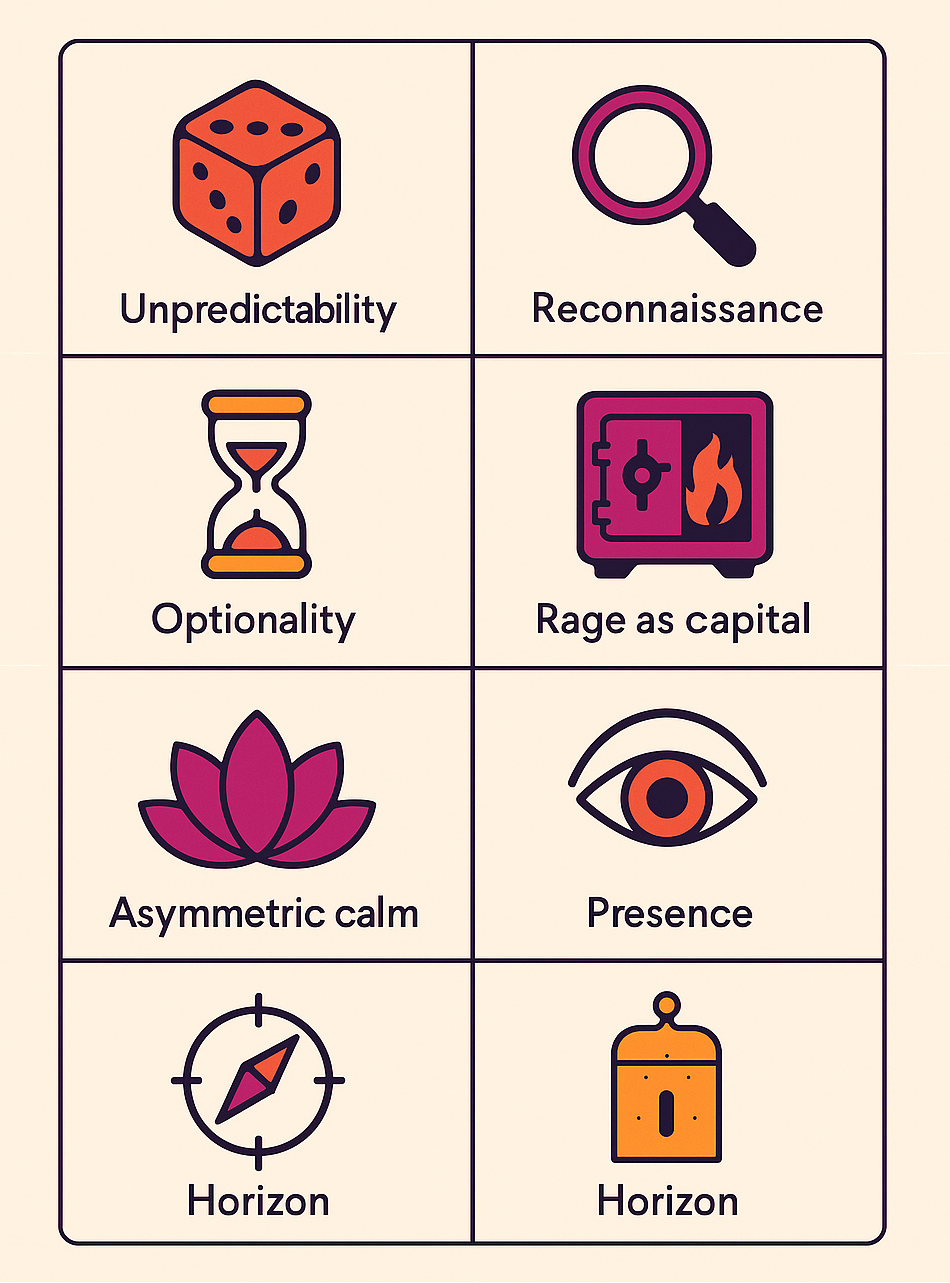
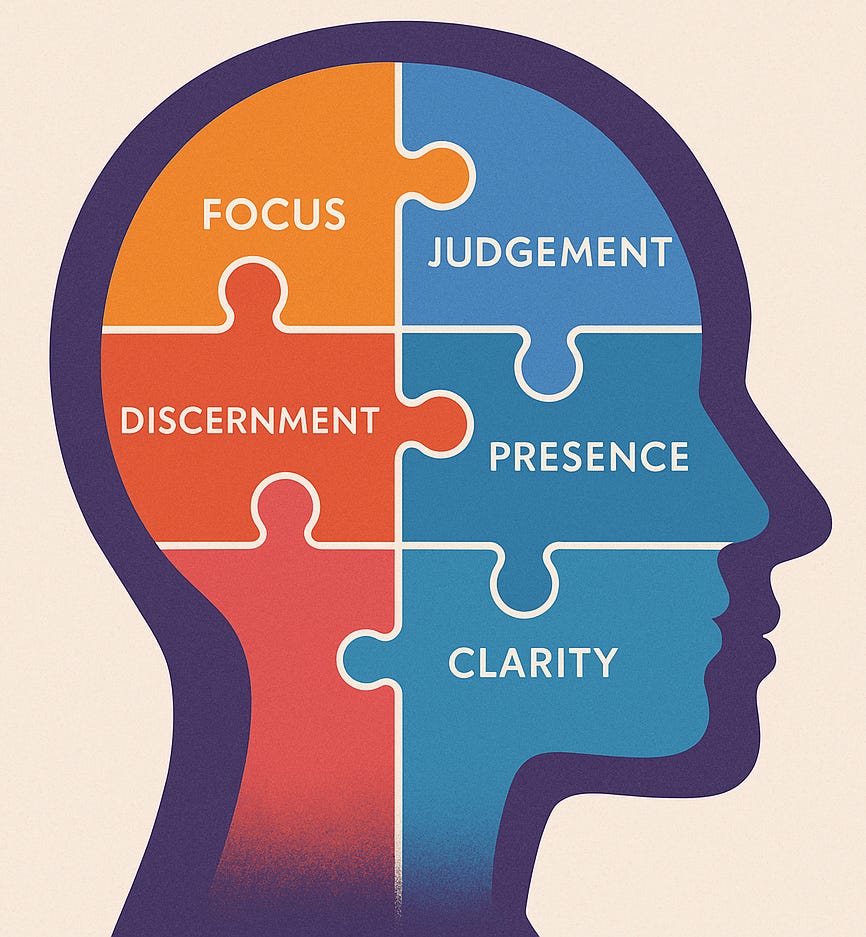
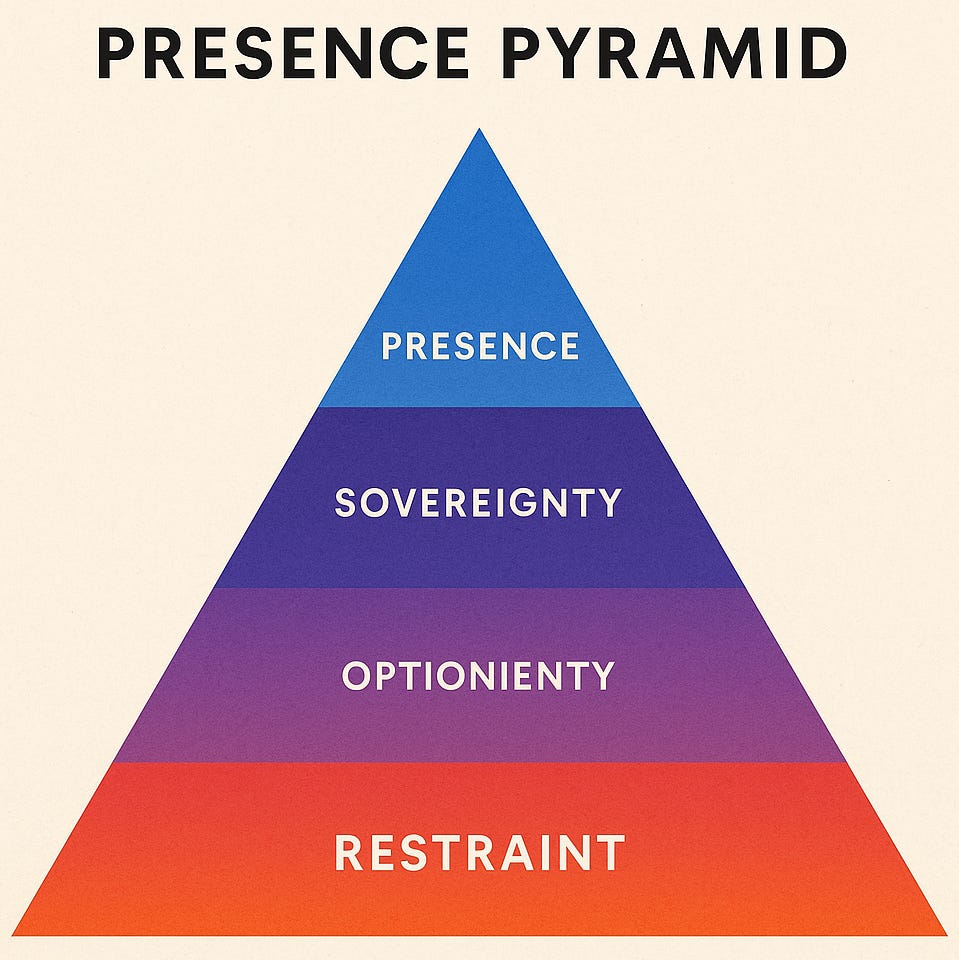
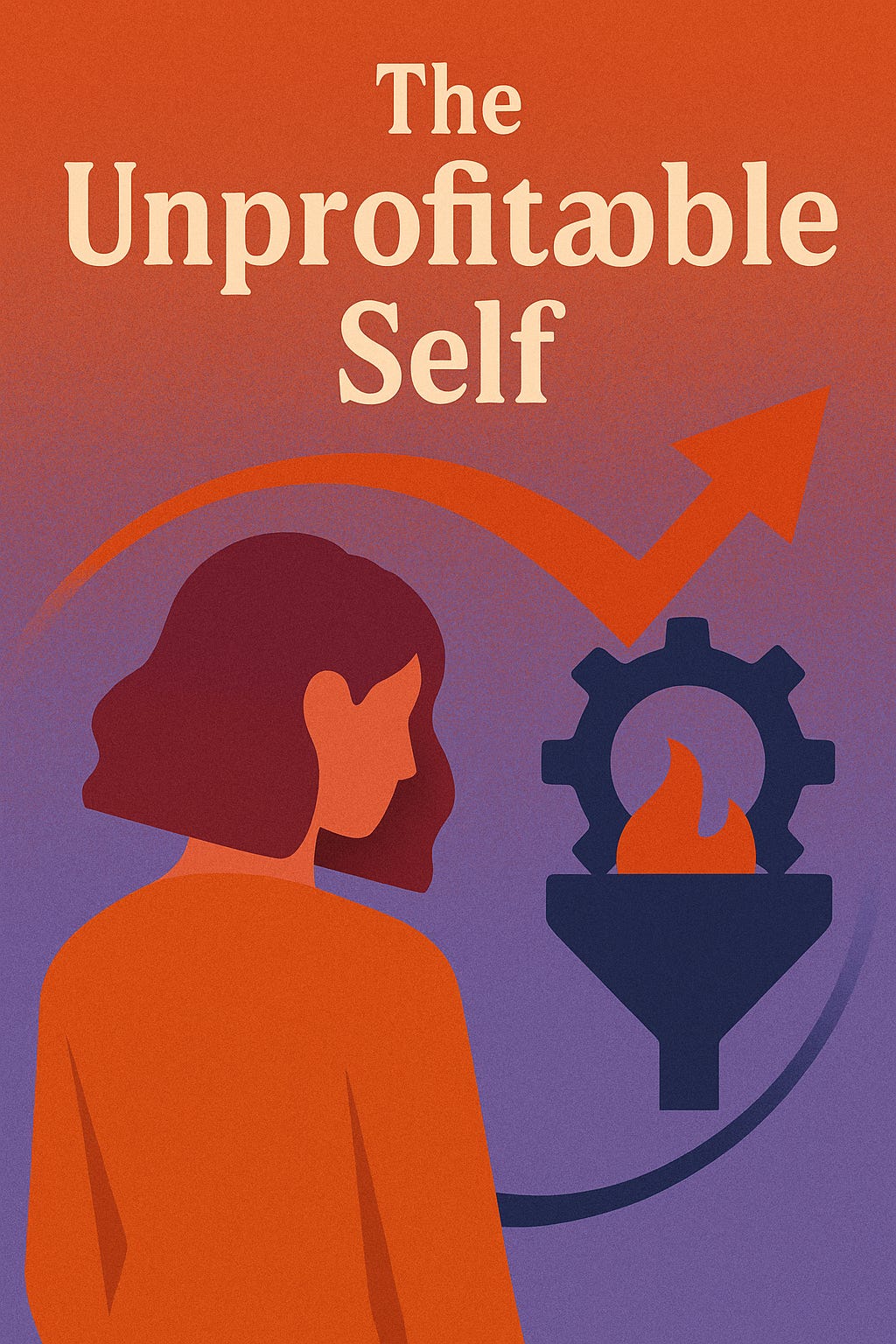
This piece will stay with me. The way you brought in Byung-Chul Han — the violence of positivity, self-regulation as a quiet form of rebellion — hit so close to home. So many of us have moved through the world feeling like we have to always be open, always share, always be seen. And it’s only now we’re beginning to understand how that constant visibility can actually take us further away from ourselves.
I especially loved how you wove in the idea that visibility isn’t the same as agency — that learning to pause, to not react immediately, is a strength. The reference to Christopher Lasch and mimetic desire was such a powerful reminder too — how often are we performing desire, or even authenticity, just to feel like we belong?
Thank you for holding space for all of this, and for gently showing that there’s another way — that we can build our way into the world with care, with patience, without having to always explain or offer ourselves up. You’ve put words to a feeling I’ve been sitting with for a while now. :)
Love this, Harnidh! I've been doing a lot of reading on platform regulation (the legal kind), so this one was a very interesting and different take on this. :)